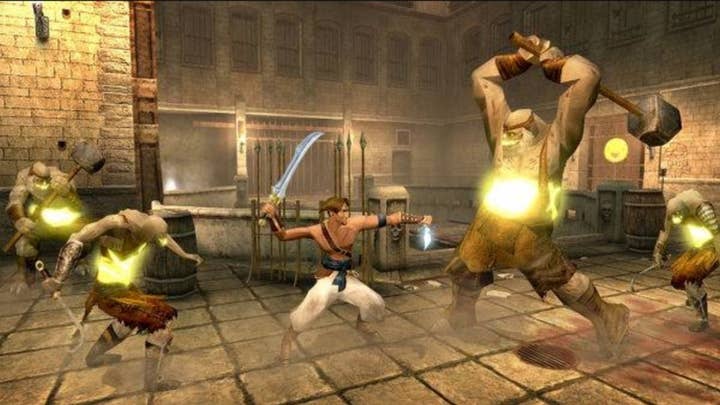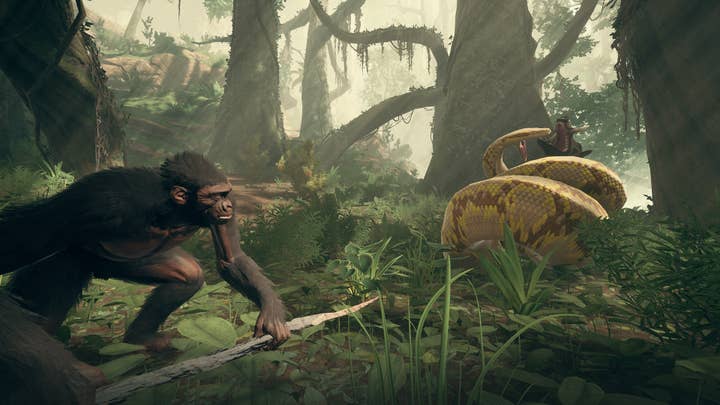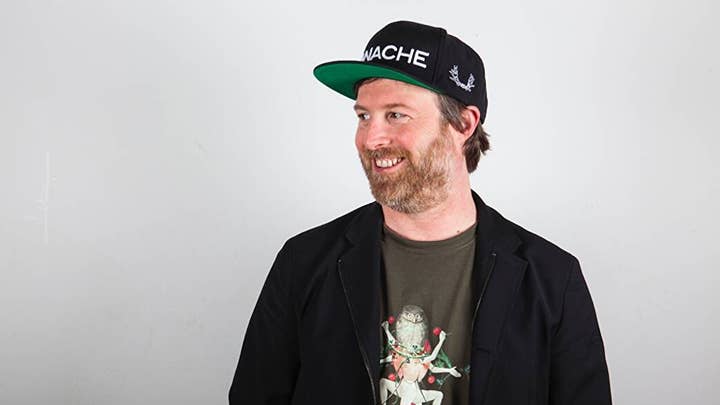Patrice Désilets and his lifelong obsession with time
The original Assassin's Creed's creative director reflects on his career, and the importance of gameplay mechanics before story
Sign up for the GI Daily here to get the biggest news straight to your inbox
In 1997, a young and eager Patrice Désilets had just graduated from film school and was looking for a job. Ubisoft Montreal happened to have just opened its offices. But becoming a video game developer wasn't really the plan.
"Not even close," he tells GamesIndustry.biz. "I studied movies and theater. I thought I would be making movies. But I applied for a job because I was a gamer."
He had been playing games since the early Eighties, enjoying Choplifter, Lode Runner and other games on the Apple II. So he went for an interview without having the slightest idea of how to make a video game, armed only with his knowledge as a gamer and a reader of specialized press. It went well.
To an extent, the lack of specific experience helped him "have a good interview, because they stumbled on a guy who had a pretty wide array of interests and knowledge. And who also knew games." But not being literate about established rules of game design also helped him bend those same rules.

His first project in Ubisoft was Playmobil adaptation Hype: The Time Quest. In hindsight, that was also the beginning of an obsession with time that spans his whole career.
"Time", he says, "is the only dimension we can't control. And that's fascinating. So it's particularly cool to use time as the basis for the central fantasy of a game".
With Hype: The Time Quest, he and the team tried to pay homage to the classic JRPG Chrono Trigger. "It was a new studio and everybody had just come out of school. When they opened Ubisoft Montreal, they brought some experienced producers but no senior game designers. We had to learn on the fly."
Was this scary for young Désilets? "Not when you're 23, you have a job and you get paid. You're happy."
It was also a time of profound changes in the industry and Désilets thinks that "people who started at that time were the last of the pioneers". He is still amazed by how well Nintendo was able to master 3D on the first try with Super Mario 64, but notes that most of the games on the market, even many of the great games, were still designed with a 2D mindset – "based on precision, on being on that exact pixel before jumping off the ledge."
"We had to change that," he says. "We could still demand precision from the player, but it had to be in a different context."
After working on a few other projects, Désilets was made creative director on the Prince of Persia reboot – although he wasn't familiar with the original game.
"Time is the only dimension we can't control. So it's cool to use as the basis for a game"
"I understood that it was well animated and about solving puzzles, so I tried to keep the core of what people loved about it and make a new game with that."
And something new they made. Prince of Persia: The Sands of Time managed to execute the transition from 2D to 3D in a masterful way.
"The holes", he tells us, "the obstacles, were always a bit smaller than the distance you could cover with a jump. Sure, you could make mistakes, but you didn't have to be exactly precise, on pixel. Plus, there was the rewind… That allowed us to keep a core part of a Prince of Persia game, which is you dying a lot, but without the frustration that used to come with it."
Désilets says the idea for the rewind "suddenly hit [him]" while watching TV one evening; he missed a line of dialogue and had to rewind so he could rewatch the scene. He then had to sell the idea to the team, but he found an ally in a programmer named Martin Sévigny.
"Me watching TV that night and Martin saying 'yes' changed my life. You always need someone else."
After the success of The Sands of Time, Ubisoft gave Désilets the task of developing a next generation Prince of Persia with one imperative: "redefining action-adventure games." He immediately found himself struggling with the limits of the franchise. At the same time, Ubisoft also wanted to change the setup, because Sands of Time's direct sequels weren't selling exceptionally well. So Désilets dived into historical research, and was inspired by an ancient myth about an assassin living in a mountain.
Assassin's Creed was born, initially with the title Prince of Persia: Assassin. The first game in what is now Ubisoft's flagship series broke free of its forebear's limits, by introducing free roaming exploration, but also kept part of the Prince of Persia pillars, with the platforming element, the sword duels, the setting, and – through the Animus – the idea of an outside narrative frame that, in a way, allows you to rewind the action diegetically in case of death.

Even though the story was about assassins, killing people wasn't really the point. It was a game about a character asking himself why he does what he does, why he follows rules or what governments tell us to do. This thematic throughline would end up being quite influential. In 2007, the theme of free will really hit the video games zeitgeist, with Assassin's Creed and BioShock tackling similar topics in very popular AAA games that influenced so many titles in the following decade.
"That's because it's something we have to deal with as humans," Désilets says. "We are always told how it's supposed to work. We struggle to suppress our inner freedom and… should we? Why would I follow the rules and the dogma? It's a struggle."
"The player will not follow your rules all the time. They will do what they want and break your carefully built story"
This also connects with Désilets' design philosophy. "With my games, I try to evoke sensations, not emotions, because the player will not follow your rules all the time. They will do what they want and break your carefully built story."
This struggle between rules and player behaviour is at the base of Désilets' approach to telling a story through a video game: "The story you tell through the game must be about the features, the mechanics. That's how you are able to tell a story that's not gonna be messed up by the players doing what they want. In Prince of Persia, the prince shakes the palace up when he activates his powers. That creates a contextual reason for the gameplay, because otherwise it wouldn't make sense to have a palace full of holes, dangers, platforms.
"And not only that, it's a Prince of Persia game, so it's important to have booby traps, but… why the hell should there be traps in the palace? Well, because your actions trigger all the defense systems of that building. So of course you have to write a story, with a beginning, an end and character arcs. But the real story is that there were no booby traps and now there's booby traps. That is the story of the game."
We suggest this is important because it helps fighting the ludonarrative dissonance and he brings up another example: "One big difference between Altaïr and Ezio in Assassin's Creed is that the story of Ezio is more in line with the story of the player. He doesn't know anything about being an assassin, he's just a dumb Italian teenager. So he learns along with the player. Conversely, Altaïr was a master assassin and we had to invent a pretext to take his abilities away and give a sense of progression."
After Assassin's Creed 2, Désilets left Ubisoft and tried creating something new in THQ, but it didn't exactly go as planned. While he was working on his new IP, Amsterdam 1666, THQ collapsed and some of its assets were bought by Ubisoft. In 2013, Désilets was fired and then spent a few years fighting a legal battle to get back the Amsterdam 1666 IP. Which he did in 2016.
"I have no bad feelings against Ubisoft. Sure, I have my stories, some episodes, but they're in the past"
"It was funny, because people in Ubisoft felt I wanted to screw them over," he alleges. "But it never was my intention. Honestly, I just didn't care about them anymore, I only wanted to be able to do my thing and to protect myself. I have no bad feelings against Ubisoft. Sure, I have my stories, some episodes, but they're in the past."
And now Amsterdam 1666 could be one of his future projects. Is that daunting, given the years of speculation about what the game could be? "You know what I'm afraid of? Of it becoming my Don Quixote. The project I reach for through my whole life and I'm never able to get to. But I am not afraid of making the game. And it's not the same game I would have made back then. I'm a different game designer and creative director."
After his years in Ubisoft, Désilets says he was pigeonholed as "the history guy." He was looking for financing and everybody asked him to create something with a historical theme.
"They wanted the new Assassin's Creed," he says.
So history became his brand. Did this bother him? "It did. Not on a personal level, more on an organizational level. Making a historical game is not an easy task. It takes more money. But at the same time, I like making historical games. And we made a prehistoric game that really embraces my ideas: it's about sensation, movement, gameplay, with no history whatsoever. Again, it's a toy, not necessarily a game."
But his games are not just toys. They reflect his interest in human history, his obsession with time and an eye that seems particularly focused on an anthropological point of view.
"It fascinates me," he confesses. "How we evolve, how we change. And how different we are. And imperfect. I think history fascinates us because of how much we are disconnected from our past, because we are so different. Everything is so fast, information, communication, travel."

His most recent historical game, Ancestors: The Humankind Odyssey, came out right before the pandemic and sold over a million copies, establishing Désilets' studio Panache Digital Games as a success. While he's now in charge of his very own games firm, Désilets says he hates corporate mentality and doesn't like to give orders. This is part of the reason for Panache's ongoing hybrid working setup.
"There's no Monday," he explains. "No Monday meetings, you don't get anxious because Monday is coming. People can do what they have to do, go to the dentist, to the bank, work on their projects… I don't want to know."
Désilets also has a very personal interpretation of what a production cycle is, which he refers to as the 'sell, play, tell' cycle. Phase one is 'sell', when you are trying to sell the fantasy, the object, the idea. You prototype, you create a vertical slice that shows the art, creative and technical direction.
"It needs to be something you're proud of and that illustrates what the point of the game will be," he says.
"Making a historical game is not an easy task. It takes more money. But at the same time, I like making historical games"
Phase two is 'play' and basically integrates preproduction and production. "The game looks awful and there's not a story but it doesn't matter: you focus on fun, controls, mechanics, the second to second, the minute to minute."
Finally, there's phase three: tell. Once you understand the mechanics and the loop, you can use them to tell a story.
But, we ask him, even if he hates the corporate world, does he miss in any way the advantages it gave him in terms of scope, ambition, tech?
"Maybe," he says. "Maybe I miss the cavalry that comes and helps us out. But I don't think so. Ancestors is a pretty ambitious game, made by 25 people."
Fifteen years ago, it may have been harder to create it as an independent studio but today Désilets notes that there are tools available that mean developers don't have to create everything from scratch. Game features, meanwhile, don't necessarily have to be bigger – they just need to be precise.
"If you really find 'the thing,' you don't need 250 persons to make the game," he says.
But there's one thing the corporate world definitely left in him, that mandate Ubisoft gave him when he started his work on what was going to become the first Assassin's Creed: "To redefine the action adventure genre." Has he accomplished this yet? To Désilets, it doesn't matter.
"It's part of my brain now," he says. "I'm stuck with that mandate for the rest of my life."
Sign up for the GI Daily here to get the biggest news straight to your inbox

